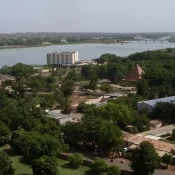
Heave hooray! Askari of Dar maintains his position
The ‘Silent African Askari’ statue in the heart of Dar es Salaam has been under siege from June this year by heavy machinery for road building, and many locals are afraid it may be destroyed.
Concerns about the safety of the famous historical monument at the intersection of Azikiwe and Samora Avenues, which honors the Africans who fought alongside the British in Tanzania against the Germans during World War I and is a popular tourist destination, were voiced by locals on social media and mainstream media.
A newspaper article titled “Why the iconic Askari Monument in Dar es Salaam shall not die” was written by Lusuga Kironde, a professor of land and urban economics in Tanzania, who was one of the people who spoke out.
The worst is now past, though, as the Chinese construction company’s bulldozers, excavators, and earthmovers have moved away, leaving the Askari standing and pointing his rifle toward the Indian Ocean.
The contractor for the Bus Rapid Transit Phase 3 project, Sinohydro Corporation Ltd., was forced to respond to public concerns by displaying a banner promising to preserve the monument’s status as a national historical site.
When I arrived, taxi drivers there welcomed me and shared their first reservations about the monument. Food and newspaper merchants had also demonstrated against what appeared to be a threat to the statue, as I discovered.
“We receive tourists from all over the world who come to Dar es Salaam City and use our cabs for full or partial days. Among the locations they go is this memorial. One of the drivers, Hassan Kombo, stated, “We want to see it stay untouched because it is attractive to everyone, not just foreigners.”
Students, vacationers, and conference attendees are among the frequent visitors.
A newspaper vendor remarked, “We were afraid the excavators would pull it down.”
Tanroads, the Tanzanian National Roads Agency, had to go out and convince the public that the monument would not be damaged because of how much fear there was.
There is an intriguing backstory about the statue. At the intersection of Samora Avenue and Azikiwe Street, the Germans erected a plaque honoring Major Herman von Weissmann, who put an end to the Arab movement in 1888. However, following their defeat, they took it down.
The current bronze African Askari was installed in November 1927 by the British in its place.
James Alexander Stevenson designed it in Britain, and it was displayed at the Royal Academy of Arts before being transported to Dar es Salaam and put in place where it is now.
The soldier is facing the Indian Ocean, which is the direction that, on September 3, 1916, British troops entered Dar es Salaam to engage in combat with the Germans.
Nairobi and Mombasa in Kenya are home to other Askari monuments in the area.
All Categories
Tags
+13162306000
zoneyetu@yahoo.com



